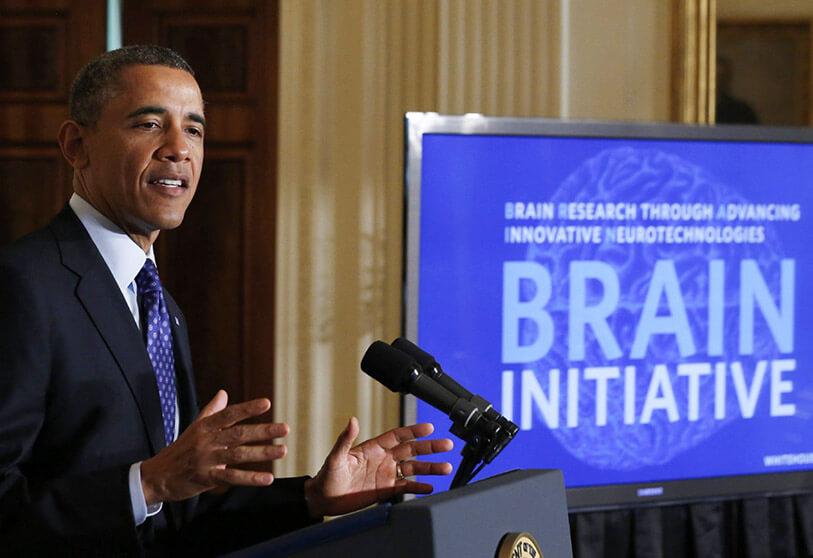Obama's BRAIN INITIATIVE and the coming 2 tier system for humanity
Posted: Sat May 14, 2022 7:48 am
Chile as a laboratory for the regulation of posthumanism https://atalayar.com/en/content/chile-l ... sthumanism https://atalayar.com/en/content/chile-l ... sthumanism
Barack Obama, in the year 2013, established the BRAIN Initiative (Brain Research through Advancing Neuroethologies) a large-scale, 12-year-long public-private research project with the goal of supporting the development and application of innovative technologies to understand the human brain and to create tools to alter neural circuits (https://www. whitehouse.gov/BRAIN). Similar initiatives are now underway in the European Union, Japan, Korea, Canada, Australia, Israel, and China ...
Private enterprises are also investing huge amounts of money, in many cases covertly, and have powerful research programs due to the infinite commercial applications of neurotechnology. For example, Facebook, Microsoft, and Google have already neurotechnology divisions and new companies specialized in the development of neurotechnologies are emerging, such as Kernel (founded by billionaire Brian Johnson) or Neuralink (founded by Elon Musk).
Rafael Yuste is a neurobiology doctor, director of the Neurotechnology Center at the Columbia University and one the founders and leaders of the BRAIN Initiative. The high-speed progress of neurotechnologies that resulted from the US and other International BRAIN Initiatives worried Dr Yuste, who saw as a pressing issue the critical tackling of the potential individual and societal impacts emanating from these new technologies. He believed it was very important to start protecting the brain from potential mischievous uses and from the geopolitical battle between major powers, by developing and funding neuroethical work to accompany these advances in neuroscience and to guide the development of neurotechnologies.
As a result, in 2017, he helped organize the Morningside Group workshop which gave birth to the concept of “NeuroRights”. From this moment, Dr Yuste has been an active advocate of NeuroRights organizing many workshops and working with governments. To this end, he launched the NeuroRights Initiative (NRI) from Columbia University’s Neurotechnology Center as an advocacy organization for these human rights directives and to develop further ethical guidance for neurotechnological innovation...
Dr Yuste saw a preeminent opportunity the 2020 Chilean national plebiscite, with which the Chilean population approved a redrafting of their Constitution. On October 7th, a Constitutional Reform (Bulletin 13.827-19), and a NeuroProtection Bill of Law (Bulletin 13.828-19) were presented to the Chilean Senate for the recognition and protection of NeuroRights. These two bills were elaborated by the Chilean Senate’s Committee led by Senator Guido Girardi, with the support of Chile's Government, Chile’s Academy of Science, all major universities in Chile, the Morningside Group Neuroethics Task Force and Columbia University’s NeuroRights Initiative.
The constitutional reform defines mental identity as a right that cannot be manipulated and that any mental intervention, including medical therapies, must be legally regulated. The bill includes five fundamental rights:
- The right to personal identity
- The right to free will
- The right to mental privacy
- The right to equal access to cognitive enhancement
- Right to protection against algorithmic bias
In addition, the Bill defines all data obtained from the brain as 'neurodata' and applies existing organ donation legislation to it, thus prohibiting the trade in neurodata. It also applies medical legislation to the future use and development of neurotechnology.
Both proposals were approved by the Senate Committee on 30 October and by the Chilean Senate on 16 December 2020.
Rafael Yuste wants NeuroRights to be a step towards regulating the rest of digital technologies in order to protect the brain from current threats such as illegal collection and trade of personal data, misinformation, Phishing, incitement to psychological or behavioural addiction on social media platforms, etc. Similarly, Yuste and his team want the next step to be a new international declaration of human rights.
The current declaration, drafted in 1948, protects the physical integrity of human beings, but at the time it was impossible to foresee the society of AI, digital platforms and neurotechnologies. It is time to protect psychological integrity as well.
Chile is not only an example in protecting neurological rights for the EU, but also in regulating possible future risks. The current legislation only regulates current behaviour, not potential future behaviour. This is the first example of a deep thinking effort to anticipate future threats in order to regulate them. Chile has overcome the "fallacy of delay" raised by Meccaci and Haselager in their paper "Identifying criteria for assessing the implications of brain reading for mental privacy". They argue that it is essential to discuss the possible implications of a technology that is still in its infancy and to overcome the inertia of legislators and policy makers who wait until technologies are fully developed before regulating them. They are concerned that because brain-reading technologies are not yet fully developed, mental privacy cannot yet be legally protected. They believe that when these technologies are fully developed, their technical characteristics and social practices will be too deeply rooted to be easily changed, as is currently the case with many computer technologies and digital platforms.
The EU should follow Chile's example and avoid harmful uses of technology. The EU should also seize the opportunity to find a regulatory ally that will engage in the battle of technology and internet regulation.
